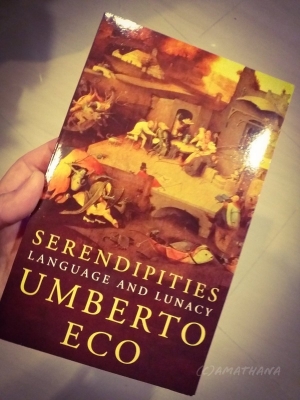Serendipities
“Serendipity is looking in a haystack for a needle and discovering a farmer’s daughter.” - Julius Comroe

Umberto Eco's book, Serendipities: Language and Lunacy, is not a book about education or technology. It is about some riddles of history and the "linguistics of the lunatic." I am an Umberto Eco reader and first noticed him, as many people did, with his novel The Name of the Rose.
That novel takes place in 1327 in an Italian Franciscan abbey that is suspected of heresy. Brother William of Baskerville arrives to investigate and the story is a medieval mystery with a series of seven murders. Eco is
and he mixes in Aristotle, Thomas Aquinas and Roger Bacon. There are secret symbols and coded manuscripts in a higher level version of the Dan Brown novel formula.
I was partially attracted to Serendipities because of the title, but it's not an easy to read novel, but rather a non-fiction study.
Eco looks at mistakes that have shaped human history. For example, Christopher Columbus assumed that the world was much smaller than it is, land so he assumed he could find a quick route to the East via the West. He was wrong, but he accidentally "discovered" America.
Cults such as the Rosicrucians and Knights Templar seem to have resulted from a mysterious starting place that was a hoax. That kind of start made both groups ripe for conspiracy theories based on religious, ethnic, and racial prejudices.
Eco posits that serendipities and mistaken ideas can have fortuitous results.
On The Writer's Almanac, there was a nice short history of serendipity, parts of which I have also written about here. The word “serendipity” was first coined in 1754, and is now defined by Merriam-Webster as “the faculty or phenomenon of finding valuable or agreeable things not sought for.”
“Serendipity” was first used by parliament member and writer Horace Walpole in a letter that he wrote to an English friend who was spending time in Italy. In the letter to his friend written on this day in 1754, Walpole wrote that he came up with the word after a fairy tale he once read, called “The Three Princes of Serendip,” explaining, “as their Highnesses travelled, they were always making discoveries, by accidents and sagacity, of things which they were not in quest of.” The three princes of Serendip hail from modern-day Sri Lanka. “Serendip” is the Persian word for the island nation off the southern tip of India, Sri Lanka.
The invention of many wonderful things have been attributed to “serendipity,” including Kellogg’s Corn Flakes, Charles Goodyear’s vulcanization of rubber, inkjet printers, Silly Putty, the Slinky, and chocolate chip cookies.
Alexander Fleming discovered penicillin after he left for vacation without disinfecting some of his petri dishes filled with bacteria cultures; when he got back to his lab, he found that the penicillium mold had killed the bacteria.
Viagra had been developed to treat hypertension and angina pectoris; it didn’t do such a good job at these things, researchers found during the first phase of clinical trials, but it was good for something else.
The principles of radioactivity, X-rays, and infrared radiation were all found when researchers were looking for something else.
A U.K. translation company put "serendipity" on a list of the English language’s ten most difficult words to translate along with plenipotentiary, gobbledegook, poppycock, whimsy, spam, and kitsch.

Eco then turns to how language tried to "heal the wound of Babel." But throughout the Middle Ages and the Renaissance, various languages were held up as the first language that God gave to Adam. Greek, Hebrew, Chinese, and Egyptian were alternately seen as the starting place for language.
These essays by Umberto Eco are prefaced with his conclusion that serendipity is the positive outcome of some ill-conceived idea.
Trackbacks
Trackback specific URI for this entryThe author does not allow comments to this entry
Comments
No comments